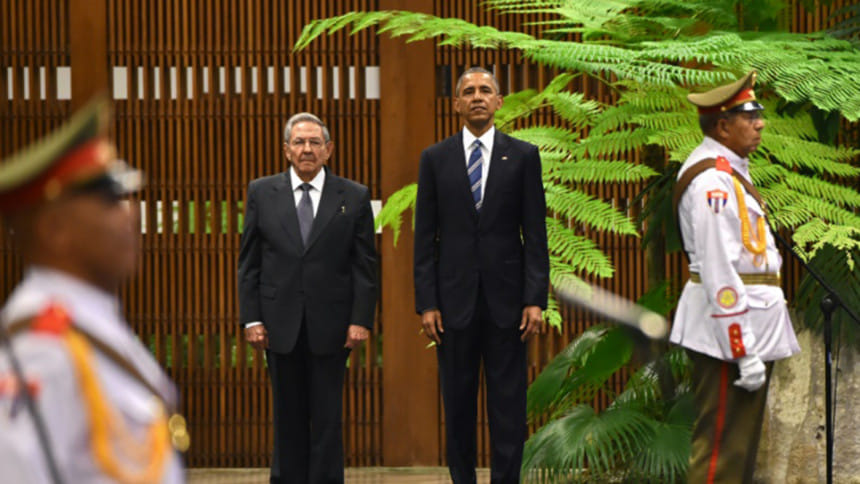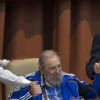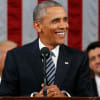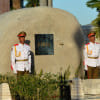Obama, Castro hail 'new day' for US-Cuba relations

Barack Obama and his Cuban counterpart Raul Castro vowed in Havana to set aside their differences in pursuit of what the US president called a "new day" for the long bitterly divided neighbors.
Castro acknowledged there were still "profound" differences over Cuba's human rights situation and the decades-old, crippling US economic embargo on the island.
In a sometimes comic, sometimes tetchy press conference -- which in an extremely rare move was carried live on Cuban television -- Castro refused even to acknowledge that his government holds political prisoners.
"After this meeting is over, you can give me a list of political prisoners, and if we have those political prisoners, they will all be released before the night ends," he said in a sarcasm-laden response to a US journalist's question.
However, the mere fact that the joint press conference took place in Havana's Palace of the Revolution -- after the leaders met for more than two hours -- demonstrated how much has changed.
Obama, the first US president to visit Cuba in 88 years, hailed a "new day" -- a "nuevo dia," as he said -- in relations between the former Cold War foes.
On Tuesday, Obama will take that message directly to Cubans, in a speech that is expected to be broadcast live across the country.
"The speech is very important because it's the one chance on this visit to really step back and just speak directly to the Cuban people," said Obama foreign policy aide Ben Rhodes.
Rhodes signaled that Obama will touch on past relations, opportunities presented by the current opening and the possibilities of the future.
Obama offered a preview of that message after his talks with Castro, saying the days of heavy-handed US intervention in the island's affairs were over.
"Cuba's destiny will not be decided by the United States or any other nation," he vowed.
The US leader also said, without making any promises on timing, that "the embargo is going to end."
Part of Obama's message is also likely to be directed at Cuban-Americans, who have been the most vociferous opponents of lifting a decades old measures that Cuba deems a "blockade."
Obama is likely to make the case that forcing Cuba to open up diplomatically, as well as a gradual relaxation of the embargo, will promote democratic change.
But Obama is defending himself from critics who say he has given away too much.
Obama's visit has raised hopes among struggling Cubans that decades of economic and political stasis may be coming to an end.
But the brief detention of dozens of pro-democracy protesters hours before Obama's arrival Sunday served as a stark reminder of the regime's desire to retain its iron grip on power.
"I believe that president Castro truly wants change," Obama told ABC News.
"I do not believe that President Castro wants to upend the ruling party or the system that they have."
HISTORY IN HAVANA
In only his third formal meeting with Castro, Obama was greeted by a military band that played the Cuban and the US national anthems.
Obama then sat with the Cuban president against a backdrop of tall tropical plants.
Earlier, he laid a wreath at the monument of Cuban independence hero Jose Marti.
And despite the excitement among ordinary Cubans, officials appeared to be taking pains to give a restrained welcome.
Castro did not greet Obama at the airport Sunday, sending his foreign minister instead, and a heavy police presence has ensured that Cubans have no chance of gathering spontaneously at any of Obama's appearances around the city.
The White House has all but ruled out a high-profile meeting between Obama and 89-year-old Cuban leader Fidel Castro.
"On this trip, we are not planning to meet with Fidel Castro," said Rhodes.
Paul Webster Hare, a former British ambassador to Cuba who teaches international relations at Boston University, said "Raul does not want a warm relationship with the US."
"He sees it in limited terms for the moment -- tourism revenue and remittances plus the changes to the sanctions," Hare added.
Later on Tuesday, Obama will also attend a baseball game between the national team and Major League Baseball's Tampa Bay Rays, before flying out.

 For all latest news, follow The Daily Star's Google News channel.
For all latest news, follow The Daily Star's Google News channel. 








Comments